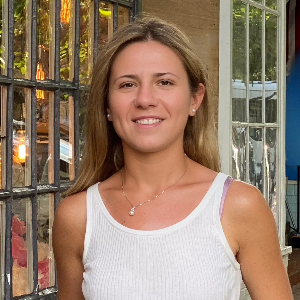
September 2023 Newsletter

September 2023 Newsletter

Student Profile
Irena Gushterova is a third-year PhD student in the Driskill Graduate Program.
After completing her undergraduate degree in biochemistry at the University of Tampa, her master’s degree in biotechnology at Columbia University and working as a research associate at Massachusetts General Hospital in Boston, Gusterova joined Northwestern as PhD candidate and works in the laboratory of Lillian Eichner, PhD, assistant professor of Biochemistry and Molecular Genetics.
Where is your hometown?
I am originally from Skopje, Macedonia but have lived in the U.S. for the past 12 years.
In the U.S., I consider Naples, Florida to be my hometown.
What sparked your interest in science or medicine?
Since I was a child, I always enjoyed learning about how things work and wondered about the unknown. The first time I found science very intriguing is when I studied about how the discovery of DNA has revolutionized our understanding of life. Naturally, my fascination with DNA ignited my curiosity to delve deeper into the world of science. However, what truly cultivated my love for science is the strong support and guidance I have received from both my family and mentors throughout the years.
What are your research interests?
I have a long-standing passion for studying the complex processes underlying cancer development. When I was introduced to translational research, I recognized how challenging it is to translate genomic findings into effective clinical care. Since then, I’ve developed a passion in applying multidisciplinary approaches to uncover how genomic alterations contribute to tumorigenesis, with the goal of identifying novel therapeutic targets.
What are you currently working on?
My thesis project in Dr. Eichner’s lab focuses on characterizing and defining the role of the Class IIa Histone Deacetylases (HDACs) as transcriptional regulators in LKB1 mutant non-small cell lung cancer (NSCLC). There is a lack of understanding how LKB1 loss leads to a unique transcriptional signature that is clinically observed in lung tumors. Our preliminary data suggests that the Class IIa HDACs are key effectors downstream of LKB1 loss. I apply different genomic approaches on both lung cancer cell lines and genetically engineered mouse models of lung cancer to identify how the Class IIa HDACs contribute to the LKB1-specific transcriptional program. Overall, our goal is to gain a better understanding of the mechanism that underlies LKB1-dependent transcriptional deregulation and identify specific weaknesses that may pave the way for new therapeutic strategies for NSCLC patients.
What is a defining moment in your education at Feinberg thus far?
I am very grateful that at Feinberg I am a part of a very supportive, interdisciplinary and collaborative research environment. That has been crucial in facilitating my professional growth, providing me with opportunities to enhance the quality and scope of my research endeavors. I am eager to continue to make the most of my time here as a PhD student and use it as a stepping stone toward becoming a well-rounded scientist.
What do you hope to do with your degree?
I am not set on a particular path. I would like to try a position in a biotech start-up environment and/or in biotech venture capital. Overall, I like to stay open-minded, embrace the uncertainty and take on any new experiences.